The rage was palpable outside the Quito funeral parlour where Fernando Villavicencio’s lifeless body lay. Inside, even close friends were searched with anti-explosives dogs. His widow was rushing to get back from Washington for the wake.
Barely 24 hours had passed since the investigative journalist turned anti-graft crusader turned presidential candidate was gunned down less than two weeks before August 20 elections in the most savage act of political violence that Ecuador has seen since the military dictatorship ended in the 1970s.
His assassination has thrust unwanted attention on this small Andean state, squeezed between the world’s two biggest cocaine producers. Just a few years ago it had enjoyed the reputation of being tranquil and relatively safe but now its descent toward becoming a narco-state has become evident in the eyes of the world.
Just this week, Dutch authorities seized about US$660 million worth of cocaine that had been hidden in a container of bananas from Ecuador. Meanwhile, FBI agents are flying in to help with the investigation as six Colombians were arrested in connection to the killing.
If security was already the top issue in the campaign, the killing is bound to alter the tone and direction of what was already an unpredictable race, begging the question of whether voters will gravitate now more toward the toughest-on-crime candidates.
“We’re indignant with what just happened, and with the country we’re living in,” said David Tituaña, 50, a taxi-driver. “This has obviously hit all Ecuadoreans in the heart, that they’ve done this to a brave man who was fighting for the ideals of our country.”
On Thursday, many mourners fought back tears.
Yet ordinary Ecuadoreans have become anaesthetised to the kidnappings, car bombs and contract killings among drug cartels that have transformed the country into one of the world’s most violent places.
Death foretold
Videos showed protesters overnight waving flags, but demonstrations were relatively sedate. There was no sign of civil unrest, nor anything that foreshadows an intervention by the military. The election date remains unchanged and a debate will still take place on Sunday.
As the nation comes to terms with a national tragedy, there is a paradox there of how people were shocked and yet not surprised.
The ultimate fate of Villavicencio, 59, had been something of a death foretold. He had received multiple threats after putting a target on his back with a defiant public pledge to take on the cocaine cartels even if it cost him his life.
“The people of this country need courageous and honest leadership,” he had told a TV anchor who warned him on air whether his confrontational style put his life at risk. “We survive by casting out fear.”
Three days later, he was murdered. The next steps will involve the inevitable soul-searching among the electorate and test its democratic credentials. Investors too are paying closer attention.
Mexico and Colombia
For Ecuador and the region at large, this is a moment of reckoning, inviting comparisons to what Mexicans endured with the killing of Luis Donaldo Colosio, candidate to the 1994 election, or what Colombians suffered at the peak of the drug war in late 1980s.
This month, there are three elections taking place within a week of each other, in Ecuador, Guatemala and Argentina. And crime is a top concern.
Villavicencio follows a long line of journalists who’ve been targeted for clashing with dangerous people in Latin America and the rest of the world.
In Russia, there is Alexei Navalny, who survived poisoning and is now in jail. In Malta, Daphne Caruana Galizia was killed by a car bomb after exposing corruption on her small island state. There too, the US Federal Bureau of Investigation tried to help uncover the mystery of her death.
Meanwhile record volumes of cocaine from Colombia keep pouring across Ecuador’s porous border, much of it to be hidden in containers of fruit and vegetables leaving Pacific ports for Antwerp and Rotterdam. That’s triggered a battle among warring gangs for control of routes and territory.
“What Colombia went through in the 1980s, and what Mexico endured in the 1990s, Ecuador is suffering today,” said former vice-president Otto Sonnenholzner, who is also on the ballot. “Our country has been handed over to drug-trafficking, and these are the consequences.”
The homicide rate has risen by more than 300 percent over the last five years, making Ecuador more violent than Colombia and Mexico.
No-ho zones
Parts of the country are now no-go zones in the grip of gangs, where truckers can no longer deliver basic products due to demands for protection money, according to María Paz Jervis, President of the Chamber of Industry and Production. In recent months, buses have been targeted with Molotov cocktails and fishermen murdered in apparent extortion attempts.
In a May interview, Villavicencio said he favoured a “tough line” on mafia bosses. But how far does one push that line? El Salvador’s President Nayib Bukele, who describes himself as the world’s coolest dictator, jailed tens of thousands of people without much due process, and won huge popularity for the crackdown.
Villavicencio himself didn’t advocate a mass roundup of lower-level criminals of the kind organized by Bukele. But in light of his death, that question - of how far is one willing to restore order - becomes even harder to escape.
He was one of Ecuador’s most prominent journalists before being elected to the legislature in 2021. He made his name exposing corruption in ex-president Rafael Correa’s populist government. Correa lives in exile in Belgium after being found guilt of bribes and sentenced to prison in absentia.
The two were fierce enemies. Polls show that, had he lived, Villavicencio might easily have faced Correa’s ally Luisa González in an October run-off.
“Villavicencio was a very brave man,;”said Ana Maria Lara, 49, who owns a business selling clothing to stores in the capital. “There aren’t many like that left.”
related news
by Stephan Kueffner & Marcelo Rochabrun, Bloomberg











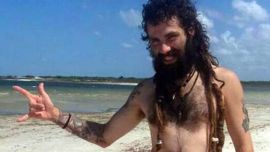








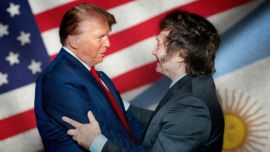
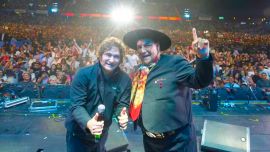
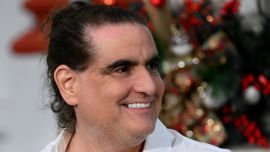
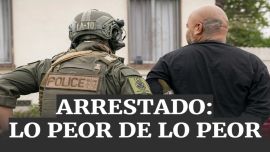
Comments